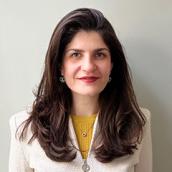What's it like working for OPM's Consultant Development Programme?
Members of our Consultant Development Programme share their experiences and what they've learned so far.
-
Date
April 2018
-
Areas of expertiseEducation , Poverty and social protection (PSP) , Cross-cutting themes
-
KeywordsGender, equality, and social inclusion , Office of the Chief Economist , Consultant development programme , Data collection , Impact evaluation , Inequality , Technical assistance , Value for Money (VFM) , Skills, livelihoods and education systems , Inclusive education , Girls' education , Primary education , Secondary education , Violence Against Women & girls (VAWG) , Social protection , Poverty , Government Statistics , Qualitative Data Collection , Survey , Third-Party Monitoring (TPM)
Many early-career international development professionals start their work with OPM in the Consultant Development Programme, where they can develop and refine their technical skills and gain experience across the key thematic areas of international development, such as health, education, public financial management, and private sector development. In this blog post, some of the team members share what they have done and learned so far.
Madhav Vaidyanathan
I spent the greater part of 2017 working on a targeting assessment for a large cash-transfer programme in Kenya. Recently, the implementers of the programme changed the method of the identification and selection of cash transfer recipients. This was tested by piloting the new targeting mechanism. Our team was then involved in the assessment of the piloted mechanism in Turkana county, in northern Kenya. My role comprised several activities, such as the development and design of a survey questionnaire, the implementation of the data collection process, and the data analyses of the targeting performance. An effective questionnaire requires well-defined, simple questions, which we programmed using a Computer-Assisted Personal Interviewing (CAPI) format, as the interviews were to be administered on tablets.
This was my first exposure to software for large-scale household survey administration. We then trained local researchers and began data collection. This provided an opportunity to interact with the local enumerators, and to gain some insights into the requirements for an efficient data collection field set up. The data collection was frequently monitored, through a number of systems, which were set up for quality assurance. To me, this was extremely valuable as I was able to better understand the details required to obtain quality data. Finally, I supported data management and analysis. This gave me an opportunity to partake in the discussions around suitable quantitative methods for analyses, based on the outlined research questions and constraint by the available data. By partaking in all of these activities, I learned how data are used to measure different outcomes and different evaluation methods are interlinked.
The work on this targeting assessment was my first comprehensive exposure to a programme assessment and has proven valuable for my other current projects.
Zara Durrani
I’ve recently returned from a week-long planning visit to Freetown as part of OPM’s core project management team leading the second round of the Secondary Grade Learning Assessments under the Leh wi Lan (Let us Learn) programme in Sierra Leone. I worked on the same project for much of last year as well, but in an analyst capacity, so it’s been somewhat of a shift in gears this time. Much of the same principles apply though - advance planning and good organisational skills, capacity building of local partners and researchers, team management and support (including juggling several different hats as and when required), continuous engagement with stakeholders and partners (to keep everyone involved and motivated), and the added sprinkle of long hours and last minute requests.. But as my (re-)joining round two of the survey evidences, it’s been a great (and continuous) learning and progression experience.
I’m based in OPM’s Pakistan office in Islamabad, and over the course of the two and a half years I’ve been with OPM so far, things have fluctuated quite nicely between local and international work. I’m currently also managing and providing technical inputs into the qualitative workstreams of two other projects in Pakistan (one on WASH, the other in education) and recently led a large social protection bid effort with the team here. So in my experience, the glocal has generally worked out pretty usefully - there is exposure (both direct and indirect) to knowledge, ways-of-working and a wide pool of some quite frankly brilliant staff in OPM’s Oxford and other international offices; and then opportunity to apply and contextualise what one learns from these two projects and experiences in different settings as part of a dynamic and growing local team.
Hanna Laufer
When I joined OPM in March 2017, I did so to gain exposure to different sectors of international development. I had been working in financial sector development in South Africa and Namibia for three years and wanted to both advance my technical skills and broaden my thematic exposure. Within my first weeks at OPM, I stumbled into a human resources for health project in Guinea, which quickly became a substantial part of my work at OPM and offered some steep learning curves.
The project’s objective was to elicit health worker’s preferences concerning their labour market decisions, and to propose incentives for the rural attraction and retention of health professionals. It consisted of a representative survey of health workers and included a discrete choice experiment component. I was given the opportunity to partake in technical discussions and support the development of research framework and the design of research instruments. This proved incredibly interesting, as the project team consists of technical experts as well as academics. I was able to travel to Guinea to support the training of enumerators, the piloting of questionnaires, and the monitoring of data entry. Due to a fairly complex work environment, I also learned about the importance of stakeholder management, the challenge of consolidating rigorous research frameworks with ground realities, and the power of improvisation. Now data collection is completed and I am looking forward to gaining insights into the analysis of experimental data.
This said, I am still able to work on financial sector projects and was involved in an education project, consisting of qualitative research in northern Nigeria for a teacher training programme evaluation.
Alexandra Doyle
I joined OPM in July 2015 as an intern and had a truly cross-cutting experience working with the education team, the WASH team, and spending two weeks in Nepal working on a health project. Subsequently, I joined the Consultant Development Programme permanently as an assistant consultant and, using my skills in econometrics, quite quickly began working on a quantitative evaluation of a social protection programme in Bangladesh.
However, the second large project I worked on, a qualitative evaluation of a school training programme in northern Nigeria, had an unexpected impact on my trajectory at OPM. This project gave me the challenge and opportunity to learn and apply qualitative research skills and I was involved in designing the study, training researchers, managing research teams, analysing the data, and writing the report. Since then, I have (largely) left STATA and my quantitative work behind me and have spent a lot of time doing fieldwork for qualitative research projects often working with the social protection team. This repeated work resulted in a quite natural move to the poverty and social protection team in January 2017.


